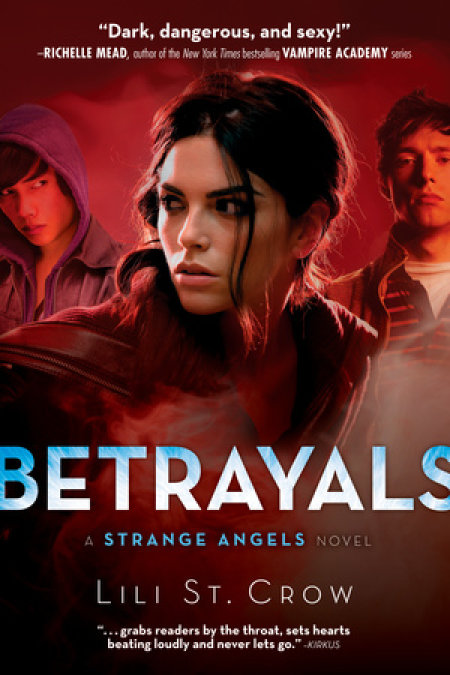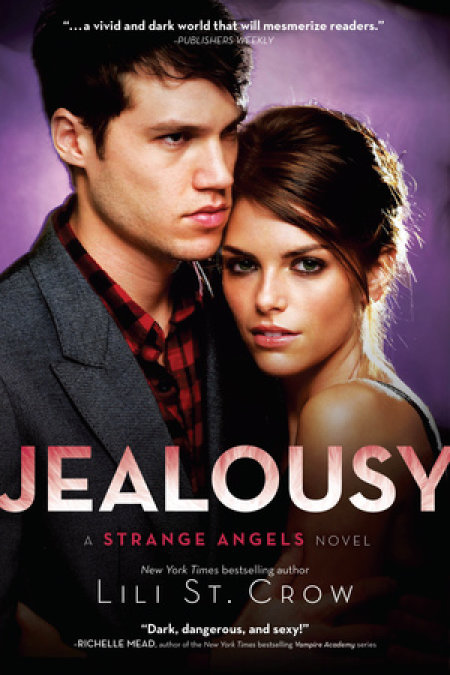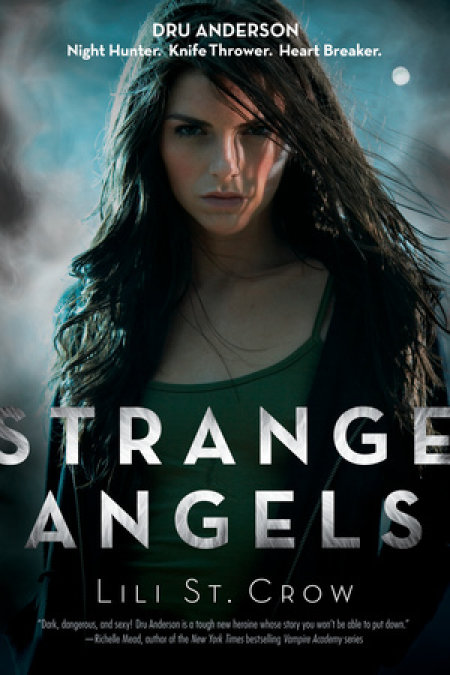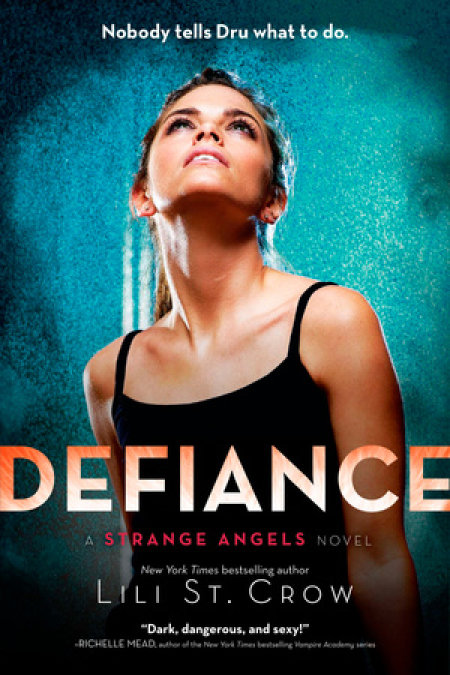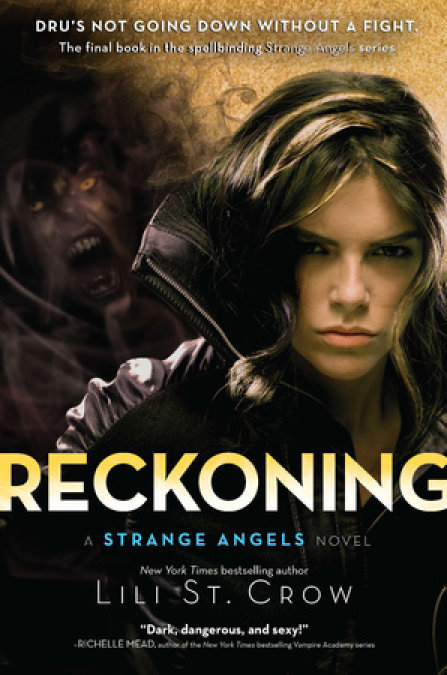p r o l o g u e
I didn’t tell Dad about Granmama’s white owl. I know I shouldhave.
There’s that space between sleep and dreaming wherethings—not quite dreams, not fully fledged precognition, but weirdlittle blends of both—sometimes get in. Your eyes open, slow anddreamy, when the sense of someone looking rises through the cotton-woolfog of being warm and tired.
That’s when I saw it.
The owl ruffled itself up on my windowsill drenched in moonglow,each pale feather sharp and clear under icy light. I hadn’t botheredto pull the cheap blinds down or hang up the curtains. Why bother,when we—Dad and me—only spend a few months in any town?
I blinked at the yellow-eyed bird. Instead of the comfort thatmeans Gran is thinking about me—and don’t ask how I know thedead think of the living; I’ve seen too much not to know—I felt asharp annoyance, like a glass splinter under the surface of my brain.The owl’s beak was black, and its feathers had ghostly spots likecobwebs, shadows against snowy down. It stared into my sleepy eyesfor what seemed like eternity, ruffling just a bit, puffing up the wayGran always used to when she thought anyone was messing with me.
Not again. Go away.
It usually only showed up when something interesting or reallyfoul was about to happen. Dad had never seen it, or at least I didn’tthink so. But he could tell when I had, and it would make him reachfor a weapon until I managed to open my mouth and say whether wewere going to meet an old friend—or find ourselves in deep shit.
The night Gran died the owl had sat inside the window whileshe took her last few shallow, sipping breaths, but I don’t think thenurses or the doctor saw it. They would have said something. By thatpoint I knew enough to keep my mouth shut, at least. I just sat thereand held Gran’s hand until she drained away; then I sat in the hallwhile they did things to her empty body and wheeled it off. I curledup inside myself when the doctor or the social worker tried to talk tome, and just kept repeating that my dad would know, that he was onhis way—even though I had no clue where he was, really. He’d beengone a good three months, off ridding the world of nasty things whileI watched Gran slide downhill.
Of course, that morning Dad showed up, haggard and unshaven,his shoulder bandaged and his face bruised. He had all the ID,signed all the papers, and answered all the questions. Everythingturned out okay, but sometimes I dream about that night, wonderingif I’m going to get left behind again in some fluorescent-lit corridorsmelling of Lysol and cold pain.
I don’t like thinking about that. I settled further into thepillow, watching the owl’s fluffing, each feather edged with coldmoonlight.
My eyes drifted closed. Warm darkness swallowed me, andwhen the alarm clock went off it was morning, weak winter sunshinespilling through the window and making a square on the browncarpet. I’d thrashed out of the covers and was about to freeze my assoff. Dad hadn’t turned the heater up.
It took a good twenty minutes in the shower before I felt anythingclose to awake. Or human. By the time I stamped down the stairs, Iwas already pissed off and getting worse. My favorite jeans weren’tclean and I had a zit the size of Mount Pinatubo on my templeunder a hank of dishwater brown hair. I opted for a gray T-shirt anda red hoodie, a pair of combat boots and no makeup.
Why bother, right? I wasn’t going to be here long enough foranyone to care.
My bag smacked the floor. Last night’s dishes still crouched inthe sink. Dad was at the kitchen table, his shoulders hunched overthe tray as he loaded clips, each bullet making a little clicking sound.“Hi, sweetheart.”
I snorted, snagging the orange juice and opening the carton,taking a long cold draft. I wiped my mouth and belched musically.
“Ladylike.” His bloodshot blue eyes didn’t rise from the clip, andI knew what that meant.
“Going out tonight?” That’s what I said. What I meant was,without me?
Click. Click. He set the full clip aside and started on the next.The bullets glinted, silver-coated. He must have been up all nightwith that, making them and loading them. “I won’t be in for dinner.Order a pizza or something.”
Which meant he was going somewhere more-dangerous, notjust kinda-dangerous. And that he didn’t need me to zero the target.So he must’ve gotten some kind of intel. He’d been gone every nightthis week, always reappearing in time for dinner smelling of cigarettesmoke and danger. In other towns he’d mostly take me with him;people either didn’t care about a teenage girl drinking a Coke in abar, or we went places where Dad was reasonably sure he could stopany trouble with an ice-cold military stare or a drawled word.
But in this town he hadn’t taken me anywhere. So if he’d gottenintel, it was on his own.
How? Probably the old-fashioned way. He likes that better, I guess.“I could come along.”
“Dru.” Just the one word, a warning in his tone. Mom’s silverlocket glittered at his throat, winking in the morning light.
“You might need me. I can carry the ammo.” And tell youwhen something invisible’s in the corner, looking at you. I heard thestubborn whine in my voice and belched again to cover it, a nicesonorous one that all but rattled the window looking out onto thescrubby backyard with its dilapidated swing set. There was a box ofdishes sitting in front of the cabinets next to the stove; I suppressedthe urge to kick at it. Mom’s cookie jar—the one shaped like a fatgrinning black-and-white cow—was next to the sink, the first thingunpacked in every new house. I always put it in the bathroom boxwith the toilet paper and shampoo; that’s always the last in and firstone out.
I’ve gotten kind of used to packing and unpacking, you couldsay. And trying to find toilet paper after a thirty-six-hour drive is nofun.
“Not this time, Dru.” He looked up at me, though, the bristlesof his cropped hair glittering blond under fluorescent light. “I’ll behome late. Don’t wait up.”
I was about to protest, but his mouth had turned into a thin,hard line and the bottle sitting on the table warned me. Jim Beam. Ithad been almost full last night when I went to bed, and the dregs ofamber liquid in it glowed warmer than his hair. Dad was pale blond,almost a towhead, even if his stubble was brown and gold.
I’ve got a washed-out version of Mom’s curls and a better copyof Dad’s blue eyes. The rest of me, I guess, is up for grabs. Exceptmaybe Gran’s nose, but she could have just been trying to make mefeel better. I’m no prize. Most girls go through a gawky stage, but I’mbeginning to think mine will be a lifelong thing.
It doesn’t bother me too much. Better to be strong than prettyand useless. I’ll take a plain girl with her head screwed on right overa cheerleader any day.
So I just leaned down and scooped up my messenger bag, thestrap scraping against my fingerless wool gloves. They’re scratchy butthey’re warm, and if you slip small stuff under the cuff, it’s damnnear invisible. “Okay.”
“You should have some breakfast.” Click. Another bullet slidinto the clip. His eyes dropped back down to it, like it was the mostimportant thing in the world.
Eat something? When he was about to go out and deal with badnews alone? Was he kidding?
My stomach turned over hard. “I’ll miss the bus. Do you wantsome eggs?”
I don’t know why I offered. He liked them sunny-side up, butneither Mom or me could ever get them done right. I’ve beenbreaking yolks all my life, even when he tried to teach me the rightway to gently jiggle with a spatula to get them out of the pan. Momwould just laugh on Sunday mornings and tell him scrambled orover-hard was what he was going to get, and he’d come up behindher and put his arms around her waist and nuzzle her long, curlingchestnut hair. I would always yell, Ewwww! No kissing!
And they would both laugh.
That was Before. A thousand years ago. When I was little.
Dad shook his head a little. “No thanks, kiddo. You havemoney?”
I spotted his billfold on the counter and scooped it up. “I’mtaking twenty.”
“Take another twenty, just in case.” Click. Click. “How’s schoolgoing?”
Just fine, Dad. Just freaking dandy. Two weeks in a new town isenough to make me all sorts of friends. “Okay.”
I took two twenties out of his billfold, rubbing the plastic sleeveover Mom’s picture with my thumb like I always did. There wasa shiny space on the sleeve right over her wide, bright smile. Herchestnut hair was as wildly curly as mine, but pulled back into aloose ponytail, blonde-streaked ringlets falling into her heart-shapedface. She was beautiful. You could see why Dad fell for her in thatpicture. You could almost smell her perfume.
“Just okay?” Click.
“It’s fine. It’s stupid. Same old stuff.” I toed the linoleum and sethis billfold down. “I’m going.”
Click. He didn’t look up. “Okay. I love you.” He was wearing hisMarines sweatshirt and the pair of blue sweats he always worked outin, with the hole in the knee. I stared at the top of his head while hefinished the clip, set it aside, and picked up a fresh one. I could almostfeel the noise of each bullet being slid home in my own fingers.
My throat had turned to stone. “’Kay. Whatever. Bye.” Don’t getkilled. I stamped out of the kitchen and down the hall, one of thestacked boxes barking me in the shin. I still hadn’t unpacked theliving room yet. Why bother? I’d just have to box it all up in anothercouple months.
I slammed the front door, too, and pulled my hood up, shovingmy hair back. I hadn’t bothered with much beyond dragging a combthrough it. Mom’s curls had been loose pretty ringlets, but minewere pure frizz. The Midwest podunk humidity made it worse; itwas a wet blanket of cold that immediately turned my breath into awhite cloud and nipped at my elbows and knees.
The rental was on a long, ruler-straight block of similar houses,all dozing under watery sunlight managing to fight its way throughovercast. The air tasted like iron and I shivered. We’d been in Floridabefore this, always sticky, sweaty, sultry heat against the skin likeoil. We’d cleared out four poltergeists in Pensacola and a hauntingapparition of a woman even Dad could see in some dead-end townnorth of Miami, and there was a creepy woman with cottonmouthsand copperheads in glass cages who sold Dad the silver he needed totake care of something else. I hadn’t had to go to school there—wewere so busy staying mobile, moving from one hotel to the next, sowhatever Dad needed the silver for couldn’t get a lock on us.
Now it was the Dakotas, and snow up to our knees. Great.
Our yard was the only one with weeds and tall grass. We hada picket fence, too, but the paint was flaking and peeling off andparts of it were missing, like a gap-toothed smile. Still, the porch wassturdy and the house was even sturdier. Dad didn’t believe in rentingcrappy bungalows. He said it was a bad way to raise a kid.I walked away with my head down and my hands stuffed in mypockets.
I never saw Dad alive again.
We hope you are enjoying the book so far. To continue reading...
Copyright © 2026 All Rights Reserved
